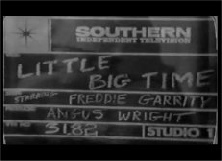
TV Pop Diaries
Pop Music on British Television 1955 -
A comedy and music series created around the annoyingly frantic Freddie and The Dreamers, or "certain English leaping gentlemen" as Keith Richards once described them.
Alongside the resident group there would be vaudeville acts, comics, magicians and animal acts. Producer Angus Wright wanted to make the show wholly professional, not relying on new or amateur talent, searching up and down the country for the best talent available. Talking to The Stage just before the pilot show Wright said "Speed, novelty and surprise are the ingredients we're looking for. There are an enormous number of talented people who are never seen on television because there aren't enough outlets for this type of entertainment".
A series of thirteen was commissioned after the successful pilot show in March 1968,
recorded at the Nuffield Theatre, Southampton to an audience of 500. Wright said
before the pilot "By using a theatre of this sort we are hoping to engender the kind
of rapport between performers and audience that characterised the heyday of pantomime".
It was the nearest ITV would come to the well established format of BBC's Crackerjack,
with adults plainly acting silly for the kids, leaving both in hysterics. Garrity
seemed resigned to his now chart-
The show proved successful and British songwriters Mitch Murray and Peter Callendar wrote a new song for Freddie, named after the show, and released as a single in November 1968. Murray had written several of Freddie's early Columbia hits.
The next series would have been broadcast in autumn 1969 and would have been Southern
TV's first colour production, but it was delayed. In February 1970 the new thirteen-
It was followed in 1971 by Oliver in the Underworld, but this time Freddie meets less friendly characters, proving a little scary for some of the audience. But no fear, there was always Freddie's Joke Hall.
The show bowed out with a fifty minute special on Boxing Day 1973 with the producers
promising the return of some familiar faces. It came back 12th June 1974 for the
first show of its final series. It was the idea of Freddie to turn each of the thirteen
shows of the final series into a mini-
Little Big Time had a long shelf life, six years, much longer than most people remember.
Children loved the series, I loved the series and despite the wiping of all the original
shows, about ten minutes of colour film footage still exists, probably made as a
promotional reel for the show's potential export and narrated by DJ Dave Cash. Three
tie-
What started as a vehicle to promote a pop group past their sell by date had in the end become a much loved and much missed relic.
LITTLE BIG TIME
Southern
30th October 1968 -
